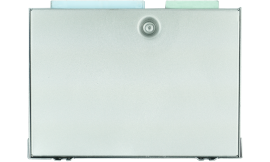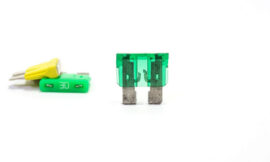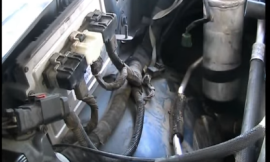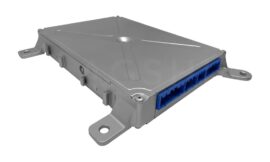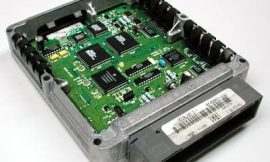Last updated on November 1st, 2024 at 11:59 am
The Acura Legend, as its name suggests, has carved a legendary status within the realm of luxury and performance vehicles. Launched in 1985 by Honda as a premier offering for their newly minted Acura division, the Legend was a trailblazer, setting the bar for Japanese luxury vehicles. Its combination of comfort, advanced technology, and exhilarating performance won the hearts of motoring enthusiasts worldwide.
The key player behind this extraordinary performance has always been the Engine Control Unit (ECU). The ECU, or as we often refer to it, the ECM (Engine Control Module) or PCM (Powertrain Control Module), serves as the vehicle’s brain, coordinating various components to ensure optimal engine performance. Whether it’s fuel injection, ignition timing, or emission controls, the ECU plays an indispensable role in maintaining the Acura Legend’s notable performance. The Legend, with its high-quality ECU, has thus managed to stand the test of time, continuing to be esteemed in the automotive world.

Symptoms of a Failing ECU in Acura Legends
However, like other sophisticated components, the ECU in an Acura Legend can also develop issues over time. Understanding the symptoms of a failing ECU can ensure timely intervention, thereby preserving the driving experience and safety:
- Unexpected Engine Behavior: A faulty ECU may lead to erratic engine behaviors, such as sudden stalling or rough idling. This can make the driving experience uncomfortable and potentially unsafe.
- Poor Fuel Efficiency: If the ECU cannot correctly regulate the amount of fuel the engine needs, your Acura Legend may consume more fuel than usual, indicating a possible issue with the ECM or PCM.
- Difficulties in Starting the Car: A failing ECU might cause problems during ignition, as the control unit cannot effectively coordinate the necessary actions for a successful start.
- Check Engine Light: While this light can indicate various issues, a lit-up check engine light that doesn’t correspond to a known issue may suggest a problem with the ECU.
- Unusual Transmission Behavior: As the ECU manages the overall operation of the engine, a failing one can create issues with gear shifts, resulting in a jerky or uncomfortable ride.
The Acura Legend’s hallmark is its seamless performance and superior safety; hence, any signs of a failing ECU should not be ignored. Immediate attention and resolution of ECU problems will help maintain the vehicle’s legendary status while ensuring the safety of its occupant.
The Domino Effect: How a Failing ECU Can Lead to Other Problems in Your Legend
A faulty ECU, ECM, or PCM in your Acura Legend can create a cascade of issues. This is because the ECU is a critical component that manages various subsystems of your vehicle. When this “brain” starts malfunctioning, its effects can be seen in multiple components that it oversees, creating a domino effect.
A failing ECU can lead to an overworked engine as the control module cannot properly regulate engine functions. This could cause your engine to overheat, leading to potential major engine damage. You may also experience reduced braking efficiency due to improper communication between the ECU and the braking system, posing a serious safety risk.
Additionally, transmission problems can accelerate due to a faulty ECU, as it plays a key role in managing gear shifts. A malfunctioning ECU can cause your vehicle to jerk or stall during shifts, leading to significant wear and tear on your transmission system over time.

Electrical systems of the car, including lights, power windows, or the radio, can also be impacted due to a faulty ECU. This is because the ECU controls and manages the electrical systems, and any malfunction can lead to erratic behavior or complete failure of these systems. Thus, a failing ECU in your Acura Legend can lead to extensive and costly damage if not addressed promptly.
Repairing or replacing a faulty ECU, ECM, or PCM promptly can prevent these potential issues and keep your Acura Legend running smoothly for years to come.
In conclusion, the ECU, or in other instances referred to as the ECM or PCM, is the linchpin for the unparalleled performance and reliability of an Acura Legend. It expertly manages various aspects of the engine, fuel efficiency, transmission, and electrical systems, delivering the seamless operation that Acura Legends are renowned for.
A failing ECU can trigger a domino effect of issues across multiple vehicle components, undermining the car’s performance, fuel efficiency, and safety. Therefore, timely detection and resolution of any ECU issues are paramount to maintain the legendary status of your Acura Legend and to ensure the safety and satisfaction of its occupants. Always remember, your ECU is more than just a component; it’s the guardian of your Acura Legend’s performance and your driving experience.
DIAGNOSTIC TROUBLE CODES THAT RELATES TO THE PCM
Diagnostic Trouble Codes (DTCs) are codes that are stored by a vehicle’s on-board diagnostic (OBD) system when it detects a fault with the vehicle’s powertrain system.
P0100: Mass or Volume Air Flow Circuit Malfunction
P0101: Mass or Volume Air Flow Circuit Range/Performance
P0102: Mass or Volume Air Flow Circuit Low Input
P0103: Mass or Volume Air Flow Circuit High Input
P0110: Intake Air Temperature Circuit Malfunction
P0113: Intake Air Temperature Sensor 1 Circuit High
P0172: System Too Rich (Bank 1)
P0120: Throttle/Pedal Position Sensor/Switch “A” Circuit Malfunction
P0130: Oxygen Sensor Circuit Malfunction (Bank 1, Sensor 1)
P0131: Oxygen Sensor Circuit Range/Performance (Bank 1, Sensor 1)
P0132: Oxygen Sensor Circuit High Voltage (Bank 1, Sensor 1)
P0133: Oxygen Sensor Circuit Slow Response (Bank 1, Sensor 1)
P0134: Oxygen Sensor Circuit Intermittent (Bank 1, Sensor 1)
P0135: Oxygen Sensor Circuit Malfunction (Bank 1, Sensor 2)
P0136: Oxygen Sensor Circuit Range/Performance (Bank 1, Sensor 2)
P0137: Oxygen Sensor Circuit Low Voltage (Bank 1, Sensor 2)
P0138: Oxygen Sensor Circuit High Voltage (Bank 1, Sensor 2)
P0139: Oxygen Sensor Circuit Intermittent (Bank 1, Sensor 2)
P0140: Oxygen Sensor Circuit Malfunction (Bank 2, Sensor 1)
P0141: Oxygen Sensor Circuit Range/Performance (Bank 2, Sensor 1)
P0142: Oxygen Sensor Circuit Low Voltage (Bank 2, Sensor 1)
P0143: Oxygen Sensor Circuit High Voltage (Bank 2, Sensor 1)
P0144: Oxygen Sensor Circuit Intermittent (Bank 2, Sensor 1)
Here is a list of some diagnostic trouble codes (DTCs) that begin with the letter “U” and could potentially indicate a fault with the powertrain control module (PCM) in a vehicle:
U0100: Lost Communication with Engine Control Module/Powertrain Control Module
U0101: Lost Communication with Transmission Control Module
U0102: Lost Communication with Transfer Case Control Module
U0103: Lost Communication with Throttle Actuator Control Motor Circuit
U0104: Lost Communication with Throttle Actuator Control Motor Circuit Range/Performance
U0105: Lost Communication with Throttle Actuator Control Motor Circuit Low
U0106: Lost Communication with Throttle Actuator Control Motor Circuit High
U0107: Lost Communication with Throttle Actuator Control Motor Circuit Intermittent
U0108: Lost Communication with Throttle Actuator Control Motor Circuit Open
U0109: Lost Communication with Throttle Actuator Control Motor Circuit Short to Ground
U0110: Lost Communication with Throttle Actuator Control Motor Circuit Short to Battery
U0111: Lost Communication with Throttle Actuator Control Motor Circuit Short to Power
U0112: Lost Communication with Throttle Actuator Control Motor Circuit Short to Ground
U0113: Lost Communication with Throttle Actuator Control Motor Circuit Short to Battery
U0114: Lost Communication with Throttle Actuator Control Motor Circuit Short to Power
U0115: Lost Communication with Throttle Actuator Control Motor Circuit Failure
U0116: Lost Communication with Throttle Actuator Control Motor Circuit Range/Performance
Note: These codes are just a small sample and there are many other DTC codes that could potentially indicate a fault with the PCM. Additionally, the specific codes that are relevant will depend on the make and model of the vehicle. It is important to consult the vehicle’s service manual or a professional mechanic for more information about interpreting DTC codes.



